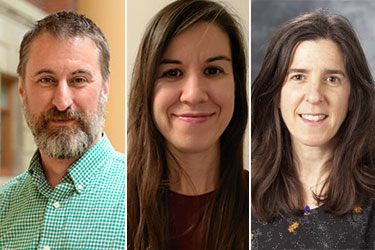A $1 million Community Impact Grant from the Wisconsin Partnership Program will help improve access to treatment and care for people struggling with substance use disorders in rural Wisconsin. The Wisconsin Hospital Association (WHA) will use the grant for its Wisconsin Rural Health and Substance Use Clinical Support (RheSUS) initiative—a collaboration with Department of Family Medicine and Community Health’s Randall Brown, MD, PhD, FASAM, and Wisconsin Voices for Recovery (WVR), led by Director Cindy Burzinski, MS, and Principal Investigator Alison Miller, DO.

L to R: Randall Brown, MD, PhD, FASAM; Cindy Burzinski, MS; and Alison Miller, DO.
The grant and collaboration support the mission and vision of WVR which strives to unite people in and seeking recovery, their families, helping professionals and allies, and remove and address barriers to recovery, eliminate stigma, and instill hope surrounding addiction. Burzinski hopes the partnership will increase access to peer support specialists and recovery coaches across Wisconsin to support the recovery of those seeking help.
“Connecting someone who is seeking treatment or recovery with someone who has lived experience can be especially helpful as the recoveree often feels connected on a more personal level due to having common experiences, which can more deeply facilitate engagement in and maintenance of recovery,” said Burzinski.
In addition, WVR plans to further implement its Emergency Department Recovery (ED2Recovery+) model by leveraging the WHA’s network of health systems to reach more people in need including people in rural areas with limited access to services. Miller is encouraged that some of the funding will be used to help educate emergency room (ER) physicians in medications for opioid use disorder (MOUD), an approach to opioid use treatment that combines the use of FDA-approved drugs with counseling and behavior therapies for people diagnosed with opioid use disorder (OUD).
“Many patients come to the ER looking for support on how to get into treatment and this is a unique time in a patient’s journey toward recovery,” shared Miller. “Our goal is to be able to support them, when they are engaged, looking for help. Connecting to peer support or recovery coaches in the ED offers support at the time as well as follow-up outside of the emergency department so individuals can continue to receive continuity of care.”
For more information on substance use disorder treatment and recovery in Wisconsin visit https://wisconsinvoicesforrecovery.org/
Published: February 2022
